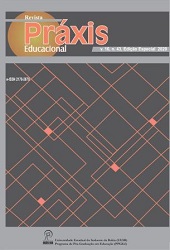FROM THE INITIAL EDUCATION OF THE TEACHER TO THE INTERNSHIP: THE DIFFERENT VIEWS ON SCIENTIFIC PRODUCTION IN LATIN AMERICA
DOI:
https://doi.org/10.22481/rpe.v16i43.6838Keywords:
Initial teacher training, Latin America, Supervised internshipAbstract
The preparation of this study was guided by the question: What does the scientific production developed in the countries of Latin America say about the conceptions and criteria of initial teacher training and internship in undergraduate courses in the period from 2009 to 2019? With the objective of making a survey in the search banks on the initial teacher training and the internship; To know and analyze the scientific production on the initial training of teachers and the internship of
undergraduate courses in the period from 2009 to 2019; Map the conceptions and criteria of initial teacher training and the stage of undergraduate courses in Latin American countries. The investigation is of a qualitative nature, supported by the methodological procedures of the bibliographic research using the software STArt. From this survey, it was obtained that the mandatory supervised internship in undergraduate courses already has traits that measure the development of this training activity associated with research, although without any regularity in the pedagogical plan of the courses. On the other hand, between the lines also allows us to see that the internship has been carried out in the predominance of technical rationality, since it is more evident the absence of teaching training practice connected with research as a structuring element of the training itself. In view of the above, it is considered that teacher education needs educational policies capable of structuring and establishing conditions for the internship to take place via research, thus creating a formative scenario in which teacher educators and trainees are attracted by the act of constituting themselves as subjects of knowledge, but with epistemological attitudes that allow them to understand and understand the formative processes and the construction of the professional teaching identity in the cognitive and humanitarian logic.
Downloads
Metrics
References
CALDERANO, Maria da Assunção. O estágio curricular e docência compartilhada: na perspectiva do realismo. 1.ª ed. Curitiba. Appris, 2017.
DOURADO, L. F. Formação de Profissionais do Magistério da Educação Básica: novas diretrizes e perspectivas. Comunicação & Educação, a. 21, n. 1, p. 29, 2016.
FREIRE, Ana Maria. Concepções orientadoras do processo de aprendizagem do ensino de estágios pedagógicos. Colóquio: modelos e práticas de formação inicial de professores, Faculdade de Psicologia e de Ciências da Educação, Universidade de Lisboa. Lisboa, Portugal, 2001. Disponível em http://www.educ.fc.ul.pt/recentes/mpfip/pdfs/afreire.pdf. Acesso em 02 de janeiro de 2020.
GATTI, Bernadete Angelina; BARRETO, Elba Siqueira de Sá. Professores no Brasil: impasse e desafios. Brasília: Unesco, 2009. P. 294.
GATTI, Bernardete et al., Professores do Brasil: novos cenários de formação. Brasília, UNESCO: 2019. Disponível em: https://unesdoc.unesco.org/search/3729ae6b-f73a-457a-8a65-bad95098af50. Acesso em 27 de dezembro de 2020.
GHEDIN, E. A articulação entre estágio-pesquisa na formação do professor-pesquisador e seus fundamentos. In: BARBOSA, R. L. L. (Org.). Formação de educadores: artes e técnicas – ciências e políticas. São Paulo: UNESP, 2006
GHEDIN, Evandro, OLIVEIRA, Elisangela S. de; ALMEIDA, Whasgthon A. de Almeida. Estágio com pesquisa. São Paulo: Cortez, 2015.
GIMENES, Camila Itikawa, O Programa Institucional de Bolsa de Iniciação à Docência (PIBID) e a formação de professores de Ciências Naturais: possibilidade para a práxis na formação inicial?. São Paulo: Faculdade de Educação da Universidade de São Paulo, 2016. Disponível em http://flacso.org.br/files/2017/07/CAMILA_ITIKAWA_GIMENES.pdf. Acesso em 03 de janeiro de 2020.
GRANVILLE, M. A. (Org.). Teorias e práticas na formação de professores. In: Sala de aula: ensino e aprendizagem. 2. ed. Campinas: Papirus, 2008. p. 67.
HABERMAS, J. (1982). Conocimiento e interés. Madrid: Taurus Ediciones, S. A. (Trabalho original em alemão publicado em 1968).
LISTON, D. P., ZEICHNER, K. M. Teacher education and the social conditions of schooling. New York, NY: Routledge, 1991.
PIMENTA, Selma Garrido; LIMA, Maria do Socorro Lucena. Estágio e Docência. 7.ª ed. São Paulo. São Paulo. Cortez, 2014.
PIMENTA, Selma Garrido; LIMA, Maria do Socorro Lucena. Estágios supervisionados e o Programa de Bolsa de Iniciação à Docência: duas faces da mesma moeda?. Revista Brasileira de Educação, v 24. 2019.
SARAVIA, L. M. La formación inicial docente. In: SARAVIA, L. M.; FLORES, I. La formación de maestros en América Latina: estudio realizado en diez países. Peru: Ministerio de Educación, DINFOCAD, PROEDUCA-GTZ, 2005.
SARAVIA, L. M.; FLORES, I. La formación de maestros en América Latina: estúdio realizado en diez países. Peru: Ministerio de Educación, DINFOCAD, PROEDUCAGTZ, 2005.
SILVESTRE, Magali aparecida; PLACCO, Vera Maria Nigro de Sousa. Modelos de formação e estágios curriculares, Revista Brasileira de Pesquisa sobre Formação Docente, v 5, n.º 5, agos/dez. 2011. Disponível em https://revformacaodocente.com.br/index.php/rbpfp/article/view/44/34. Acesso em 27 de dezembro de 2020.
ZEICHNER, K. M. Políticas de formação de professores nos Estados Unidos: como e por que elas afetam vários países no mundo. Tradução de Cristina Antunes. Belo Horizonte: Autêntica Editora, 2013.
Downloads
Published
How to Cite
Issue
Section
License
Copyright (c) 2020 Práxis Educacional

This work is licensed under a Creative Commons Attribution-ShareAlike 4.0 International License.
You are free to:
Share - copy and redistribute the material in any medium or format; Adapt - remix, transform, and build from the material for any purpose, even commercially. This license is acceptable for Free Cultural Works. The licensor cannot revoke these freedoms as long as you follow the terms of the license.
Under the following terms:
Attribution - You must appropriately give credit, provide a link to the license, and indicate if any changes have been made. You may do so in any reasonable way, but not in a way that suggests that you or your use is endorsed by the licensor.
There are no additional restrictions - You cannot apply legal terms or technological measures that legally restrict others to make any use permitted by the license.










